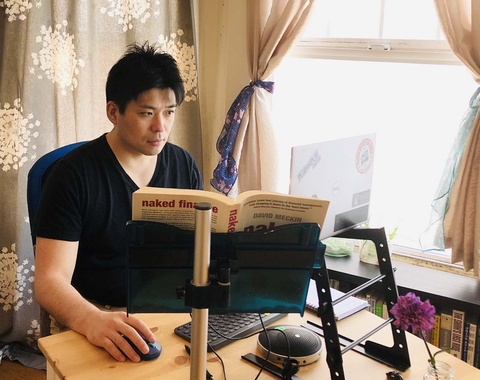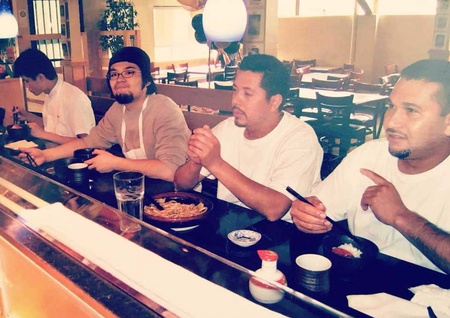Starting His American Life with a Wage of $7 Per Hour
I came to know Tsunehisa Nakajima, COO of an IT company in the outskirts of San Francisco, through an interview for the newsletter of a certain Nikkei business association. I looked up his name after the interview in order to put together his profile. I had been certain that he was an expat from Japan, but I discovered that he actually won his green card lottery shortly after the September 11 attacks and came to the United States on his own. That program has become highly competitive, and I was curious about what happened to people who immigrated to the US after winning the lottery. I asked him for another interview to learn his story.
Nakajima started to be consciously aware of America when he was into jazz music in high school. “Once I became a college student, I got into jazz more and more, and played the bass. Someone in my group went to a music college in Boston. But if I would go there, I wanted to live in America with my feet on the ground, rather than study abroad or much less travel. That was jealousy talking, though,” he laughed.
Nakajima lived in Osaka at the time. Through his close friend’s company connections, he had the opportunity to personally meet top-class musicians like Pat Metheny and Herbie Hancock. While envisioning his own future as a successful musician in America, he applied to the permanent residency program in 2001. Shockingly, he won the green card lottery on his first try. He moved to the United States in 2004 at 25 years old, landing in Berkeley in Northern California.
“I thought that I would be working in music once I was in America, but it didn’t go the way I imagined. I couldn’t speak English, I didn’t know anyone, and I didn’t have a job. I ended up working as a kitchen helper at a sushi restaurant near my apartment. In Japan, I worked at an internet company on the side while I was doing musical performances so I made decent money. Suddenly I had to restart with a wage of seven dollars per hour. The owner of the restaurant was a fair person, so he placed me under the Mexican employees because I was new. At first I felt alienated and it was very tough, but I worked hard to assimilate myself with them in my own way by eating the same food and listening to the same music.”
Eventually he quit his job at the restaurant, jumping from one job to another in an unstable lifestyle until he reached his next turning point in 2010. “I actually got married in Japan and came to the United States with my wife. She was unhappy with this (unstable) lifestyle and grew dissatisfied. She wanted a divorce I had to move out of the house we lived in and I lost my job at the same time. I became an unwanted guest in my friend’s garage. When I told my parents that I wanted to return to Japan, they told me ‘If you move back the way you are now, you’ll still be a loser. Don’t come back until you can proudly return home.’ They were right: I started as a kitchen helper in a sushi restaurant and had managed my life somehow until now.” I made up my mind and put my efforts into job hunting. As a result, I got a position in sales at a travel agency. Later, I got a job as an office worker at a food trading company, eventually promoted up to a management position, and then I transferred to my current position in the IT industry.
A Medium to Connect Nikkei and Japanese People
Now, not only is he engaged in work and music, but he is also very involved with community activities such as the Japanese Chamber of Commerce of Northern California. When I asked him about his core principles regarding these activities, he answered, “The Japanese community in the U.S. is divided. For example, the restaurant business and the IT business that I work in now are separate worlds, even though we’re all Japanese. I’m a rare case that was affiliated with both industries. I’ve been involved with various areas like live music performances, restaurants, travel, food trade, logistics, and IT. I’m also a first generation Japanese-American who obtained citizenship eight years ago. That’s why I set myself on a mission to serve as a bridge between different industries, as well as Nikkei and Japanese people.”
Next, I asked him why he became a US citizen. “Nationality is decided by chance based on where you were born, not something you choose for yourself. I was interested in whether I would feel a change within myself if I changed nationalities, like if I would no longer be Japanese. But even when I became American, the fact that I was Japanese didn’t change. That’s what I am, no matter how you look at it (laughs). There was a lot going on in America, but the big reason I decided to become a citizen was because I was able to somehow survive here, and I wanted to repay my debts to this country. I wanted to become an American citizen to fulfill that duty and responsibility.”
Moreover, Nakajima made his efforts to provide opportunities to do well in society for the young generation of Nisei born to Issei parents. “When I look at them, I see that they’re a minority in America, but they also can’t live in Japan (where their roots are). It seems many experience a kind of identity crisis. I’ve also met people in their twenties and thirties who still haven’t matured, and some blame others when things don’t go their way. I think these things happen because they have low self-esteem and confidence. I would like to spend time together with these Nisei, tell them that ‘It’s up to you whether you do something or not. Instead of blaming your parents, change your own actions,’ and try to give them opportunities.”
“Don’t blame others when things don’t go your way. It’s up to you whether you do something or not.” These words must deeply resonate with especially Nakajima who has experienced twists and turns in his life since winning the visa lottery.
© 2020 Keiko Fukuda








